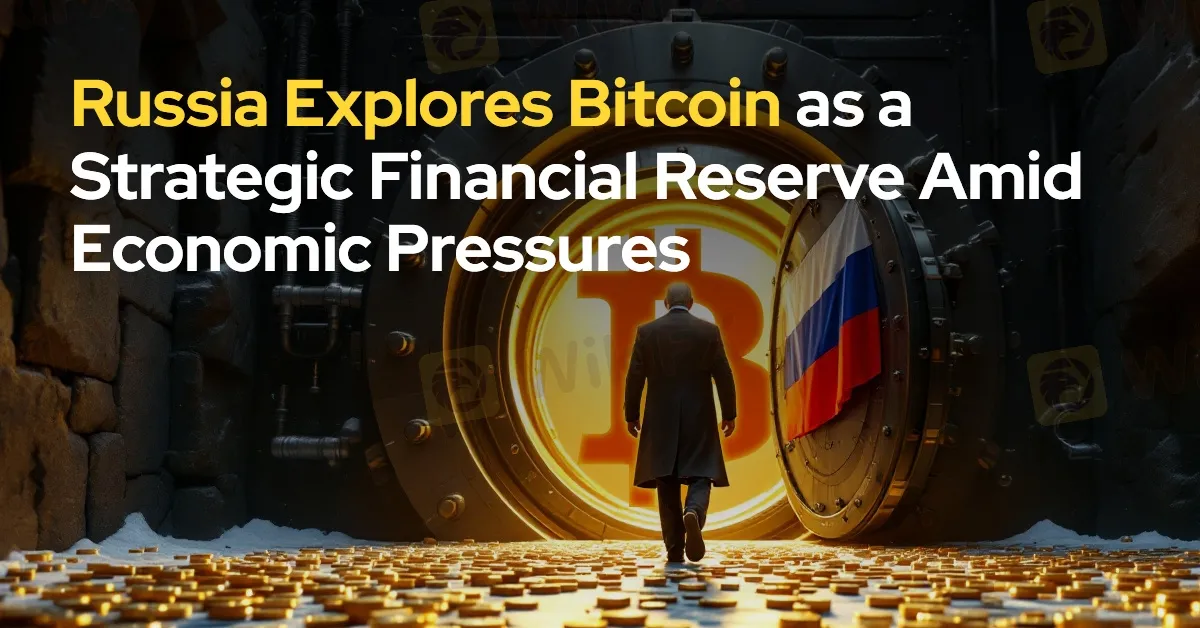简体中文
繁體中文
English
Pусский
日本語
ภาษาไทย
Tiếng Việt
Bahasa Indonesia
Español
हिन्दी
Filippiiniläinen
Français
Deutsch
Português
Türkçe
한국어
العربية
Russia Explores Bitcoin as a Strategic Financial Reserve Amid Economic Pressures
Abstract:A Russian lawmaker has urged the country’s Finance Minister to investigate the possibility of establishing a strategic Bitcoin reserve. The proposal aims to provide Russia with an alternative financial safeguard amid the ongoing challenges posed by international sanctions, inflation, and currency volatility.

A Russian lawmaker has urged the countrys Finance Minister to investigate the possibility of establishing a strategic Bitcoin reserve. The proposal aims to provide Russia with an alternative financial safeguard amid the ongoing challenges posed by international sanctions, inflation, and currency volatility.
Russias financial system has come under increasing strain, particularly following the imposition of Western sanctions. These sanctions have severely restricted Russia's access to global payment systems, creating a need for innovative solutions to ensure economic stability. In light of these pressures, Anton Tkachev, a deputy from the New People party, has suggested that Russia could benefit from holding Bitcoin as a reserve asset. He believes that Bitcoin, being less susceptible to geopolitical tensions, could offer a more secure store of value than traditional currencies.
The concept of a Bitcoin reserve is based on the idea that it could function similarly to state reserves of traditional currencies like the U.S. dollar, euro, and Chinese yuan. However, unlike these conventional reserves, which are subject to market fluctuations and external sanctions, Bitcoins decentralized nature could make it more resilient to such pressures. Tkachev highlighted the growing volatility of traditional currencies, exacerbated by inflation and the ongoing risk of sanctions. He argued that these factors are increasingly threatening the financial stability of countries, including Russia.

Given Bitcoin‘s independence from any one nation’s political influence, Tkachev proposed that it could be a valuable tool for ensuring Russias economic security during crises. His suggestion reflects the broader global trend of considering cryptocurrency as a hedge against traditional financial pressures.
Interestingly, Tkachev's idea echoes similar plans previously considered in the United States. Donald Trump, during his presidential campaign, proposed the creation of a Bitcoin reserve to help address the countrys national debt. Although the U.S. has not pursued such a plan, the growing recognition of Bitcoin as a potential store of value is becoming more widespread, with many nations evaluating its role in their financial strategies.
Tkachev also pointed out the significant returns Bitcoin has delivered in recent years, with its value reaching as high as $100,000 in December 2024. This performance has further solidified its reputation as a promising asset class. In fact, Russias Central Bank is already exploring the use of cryptocurrency for cross-border trade, signalling its potential role in the future of international finance.
Russia‘s President, Vladimir Putin, has also recently acknowledged Bitcoin’s potential, affirming that no one could ban the digital asset. As the country faces increasing sanctions from Western nations, Russia is looking towards digital currencies like Bitcoin to reduce its dependence on traditional financial systems and strengthen its economic resilience.

Disclaimer:
The views in this article only represent the author's personal views, and do not constitute investment advice on this platform. This platform does not guarantee the accuracy, completeness and timeliness of the information in the article, and will not be liable for any loss caused by the use of or reliance on the information in the article.
Read more

Gigamax Scam: Tracking Key Suspects in RM7 Million Crypto Fraud
Malaysian authorities are actively pursuing seven individuals linked to the Gigamax investment scam, which has defrauded investors of over RM7 million. The suspects include an Indonesian national, identified as Awaludin, who is believed to be the mastermind behind the scheme, and six Malaysians who served as promoters and speakers for the fraudulent operation.

Singaporean Arrested in Thailand for 22.4 Million Baht Crypto Scam
Thai authorities have apprehended a 32-year-old Singaporean man suspected of being part of a transnational syndicate involved in cryptocurrency scams. The group is accused of defrauding victims of more than 22.4 million baht (S$886,000) through a fraudulent trading platform.

Kraken and BitGo to Handle FTX Payouts Starting January 2025
Kraken and BitGo will oversee the first FTX payouts starting January 3, 2025. 98% of creditors receive at least 118% of their claims in cash.

FCA Seeks Input to Shape UK Crypto Market Regulations
UK FCA seeks public feedback on crypto rules to improve market transparency, protect consumers, and support growth. Comments are open until March 2025.
WikiFX Broker
Latest News
Geopolitical Events: What They Are & Their Impact?
Top 10 Trading Indicators Every Forex Trader Should Know
Why Do You Feel Scared During Trade Execution?
Currency Calculator


